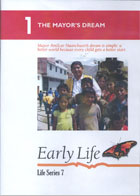
Early Life Series 2009
Distributed by Bullfrog Films, PO Box 149, Oley, PA 19547; 800-543-FROG (3764)
Produced by Television Trust for the Environment
Directed by Steve Bradshaw, Alex Gabbay, Subina Shrestha
DVD, color, 3 discs, 25 min. each
Jr. High - Adult
Child Development, Child Psychology
Date Entered: 08/18/2010
Reviewed by Carolyn Walden, Mervyn H. Sterne Library, University of Alabama at Birmingham“By improving children’s early environment, immediate environment, we can offset the detrimental effects of poverty in the world and possibly even violence.”The Early Life component of Life Series 7 from the Television Trust for the Environment (TVE) echoes this statement through three films that emphasize the importance of stimulation and interaction in the early lives of children and the subsequent effects on their social and emotional development.
In The Mayor’s Dream, the viewer travels to the Andes area of Peru to watch children in their environment and to learn the mayor of the city believes that what occurs from birth to 5 years in the life of a child creates a better future for the child. He works to ensure that a new generation of children will create “a better world because every child gets a better start.” Illustrating how evidence is increasing for the mayor’s theory, the film travels to Kenya and Turkey to observe how changes in traditional childrearing practices with little stimulation to different practices showing more communication and interaction with the babies by their mothers created more engaged children in these countries. The film discusses recent research with children at Harvard University where laboratory studies of the brain demonstrate there is compelling biological evidence to show that the early foundations for learning begin in early childhood. The studies also emphasize the need for interaction to help the development of brain circuits and to help assure healthy emotional and social development.
The second film of the series, Kibera Kids, shows a typical day in the life of four children under age 5 in Kibera, a section in Nairobi, Kenya, considered the biggest slum area in sub-Saharan Africa. In spite of the poverty, the viewer sees the interest in adults trying to enroll the children in pre-school to help change the course of their young lives. In contrast, viewers also see how different the life is for one young child unable to attend pre-school. Even though there is criticism that the West is imposing their theories on what may be considered an African child rearing model of learning from each other, the viewer hears one African professor from Cameroon and several researchers representing the Western view discuss the issues in separate conversations. The film provides additional balance by including comments from the pre-school teachers and parents who discuss the effect of a pre-school education on their children. Listening to the teachers and parents express their expectations that pre-school will be a positive experience for their children in a stimulating environment provides a personal and emotional connection to the entire discussion.
In the third film of the series, My First Day at School, viewers travel to Thailand to observe three children as they prepare for the first day of school. The situation for each child is different with one looking forward to the first day, another skeptical about school, and the third waiting for a school to attend. “Their dilemmas reflect those of Thailand as a whole: how should a country with its own traditions of childhood prepare their kids for a new, globalized society?” Researchers including professors and a Boston Children’s Hospital physician address this question in more detail. Although the film provokes more questions and does not give definitive answers, the viewer does understand the issues and sees there are no universal best practices.
Each film uses the same introductory sequence and includes energetic, spirited instrumental and vocal music appropriate for discussions of the social and emotional development of young children through pre-school activities, stimulation, and communication. Recommended for collections in child psychology and child development.